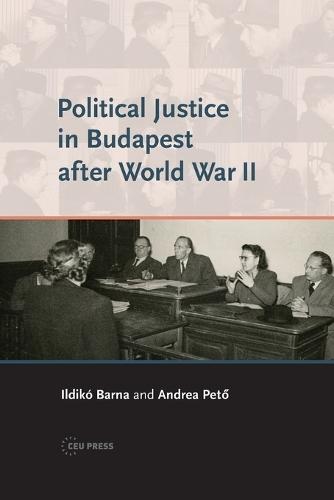Overview
In Hungary, which fell under Soviet influence at the end of World War II, those who had participated in the wartime atrocities were tried by so called people’s courts. This book analyses this process in an objective, quantitative way, contributing to the present timely discussion on the Hungarian war guilt. The authors apply a special focus on the gender aspect of the trials. Political justice had a specific nature in Hungary. War criminals began to be brought to trial while fighting was still underway in the western part of the country, well before the Nuremberg trials. Not only crimes committed during the war were tried in the same frame but also post-war ones. As far as the post-war period is concerned, legal proceedings regarding these crimes were most often launched on the basis of Act VII of 1946. This act of law concerned “the criminal law protection of the democratic constitutional order and the republic” and its basic aim was to facilitate the creation of a communist dictatorship and to deal with perceived or real enemies of the regime.
Full Product Details
Author: Andrea Pető (Professor, Central European University) ,
Ildikó Barna (Associate Professor, Eötvös Loránd University, Budapest)
Publisher: Central European University Press
Imprint: Central European University Press
Dimensions:
Width: 15.20cm
, Height: 0.70cm
, Length: 22.90cm
Weight: 0.193kg
ISBN: 9786155225987
ISBN 10: 6155225982
Pages: 136
Publication Date: 31 March 2024
Audience:
College/higher education
,
Postgraduate, Research & Scholarly
Format: Paperback
Publisher's Status: Active
Availability: In Print

This item will be ordered in for you from one of our suppliers. Upon receipt, we will promptly dispatch it out to you. For in store availability, please contact us.
Reviews
"Using very original methods combining case studies and quantitative tools, mixing testimonies and statistics, this outstanding work offers a complete reassessment of the postwar justice in Hungary as well as it provides a stimulating model to analyze others forms of contemporary transitional justice.--Henry Rousso Ildikó Barna and Andrea Peto are to be congratulated for demonstrating the potential for court records to provide precious insights on wider sociological and political phenomena and issues. The section on Arrow Cross membership, for example, contributes to the empirical refutation, if it was needed, of simplistic assumptions about the middle class nature of support for fascism in Hungary, and corroborates similar findings about the social basis of other European fascisms.--Roger Griffin In their precise quantitative analysis, based on 500 court cases, the two researchers explain the origins, functioning, and social and political composition of the so-called people's courts. In a field sadly lacking comparative studies, the two authors excel in offering a nearly unique overview of what happened in Europe as a whole to those charged with treason, collaboration, war crimes, and crimes against people. The numbers tried and sentences are dizzying but so is the subsequent high rate of amnesties. What distinguishes Hungary is that although the number of Jews killed was enormous, the survivors were numerous enough for their ""grievances"" to constitute nearly half of the people's court cases. Hence the popular charge, very much alive today, that the people's courts were but an instrument of Jewish revenge. In fact, as the book clearly reveals, Jewish victims of the Holocaust by far not always saw justice served in court.--István Deák"
Using very original methods combining case studies and quantitative tools, mixing testimonies and statistics, this outstanding work offers a complete reassessment of the postwar justice in Hungary as well as it provides a stimulating model to analyze others forms of contemporary transitional justice. --Henry Rousso Ildikó Barna and Andrea Pető are to be congratulated for demonstrating the potential for court records to provide precious insights on wider sociological and political phenomena and issues. The section on Arrow Cross membership, for example, contributes to the empirical refutation, if it was needed, of simplistic assumptions about the middle class nature of support for fascism in Hungary, and corroborates similar findings about the social basis of other European fascisms. --Roger Griffin In their precise quantitative analysis, based on 500 court cases, the two researchers explain the origins, functioning, and social and political composition of the so-called people's courts. In a field sadly lacking comparative studies, the two authors excel in offering a nearly unique overview of what happened in Europe as a whole to those charged with treason, collaboration, war crimes, and crimes against people. The numbers tried and sentences are dizzying but so is the subsequent high rate of amnesties. What distinguishes Hungary is that although the number of Jews killed was enormous, the survivors were numerous enough for their ""grievances"" to constitute nearly half of the people's court cases. Hence the popular charge, very much alive today, that the people's courts were but an instrument of Jewish revenge. In fact, as the book clearly reveals, Jewish victims of the Holocaust by far not always saw justice served in court. --István Deák
Author Information
Andrea Pető is Professor in the Department of Gender Studies at Central European University, Vienna Austria and a Doctor of Science of the Hungarian Academy of Sciences. She is teaching courses on European comparative social and gender history, gender and politics, women’s movements, qualitative methods, oral history, and the Holocaust. Ildikó Barna is Associate Professor at Eötvös Loránd University, Budapest




